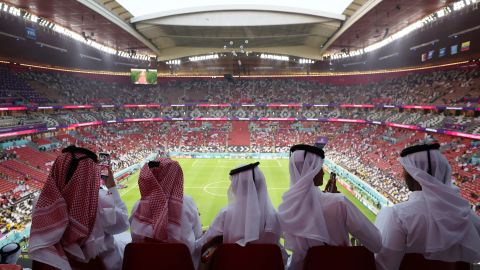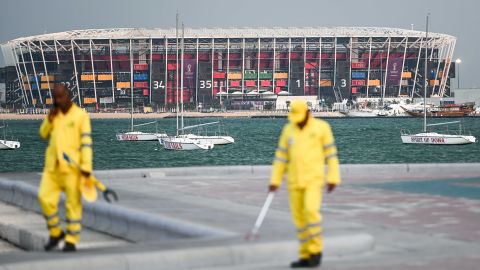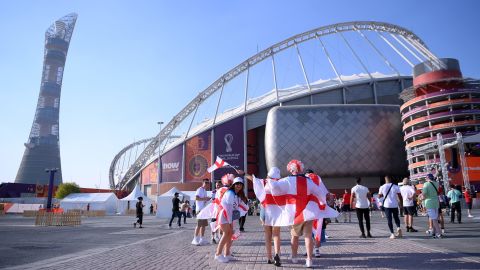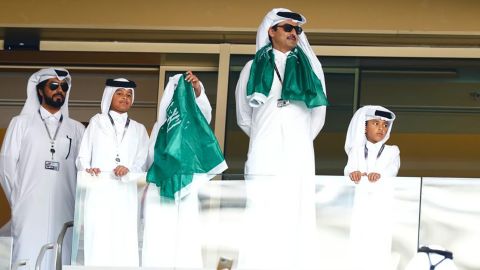The World Cup reaches its grand finale on Sunday.
Qatar has been at the center of the world over the last few weeks – and it’s been quite a ride.
RELATED; Russell Wilson Out for Broncos vs. Cardinals Despite Clearing Concussion Protocol
For Qataris, as well as putting on a well-organized tournament, the World Cup was an opportunity to expose the world to their culture, displaying everything from their architecture to their hospitality.
But being in the spotlight also brings scrutiny and much of the coverage, particularly in the western world, has centered around the Qatari government’s human rights record, from the deaths and conditions endured by migrant workers to LGBTQ and women’s rights.
Why did Qatar want to host the World Cup?
Qatar is a tiny country – smaller than Connecticut – but, despite its size, it has been asserting itself as a global player politically and economically in recent years.
The Gulf state is one of the world’s largest exporters of liquid natural gas and has carved out a role as an international mediator of conflicts, working to ensure evacuations from Afghanistan in August 2021 and hosting indirect talks between US and Iranian officials in Doha. It also launched the media network Al Jazeera.
“I think Qatar doesn’t want to just be a major power as relates to energy… I think they’re trying to set themselves apart in terms of the support that they can offer to help with kind of international conflict resolution efforts,” Anna Jacobs – Senior Gulf Analyst at the International Crisis Group (ICG) –
Hosting a World Cup plays an important part in this diversification.

Fans enjoy the pre-match atmosphere prior to the World Cup’s first game. Hector Vivas/FIFA/Getty Images
“I think sport plays [more of a role] as a political tool for Qatar, for its foreign relations, than in any other country in the world,” Danyel Reiche, a visiting Georgetown University associate professor in Qatar who is leading a research initiative on the 2022 World Cup, told CNN Sport.
The whole world is now exposed to Qatar, according to Haya Al Thani, 32, who works for “Teach for Qatar” – a local organization that works to solve problems students may face in school.
“Growing up, I was so aware of explaining where Qatar was. Because when we used to travel, and people ask where we’re from they always asked: ‘Oh, where is that?’ And now that’s become easier,” Al Thani told CNN Sport, speaking at the Virginia Commonwealth University School of the Arts in Qatar.
‘It’s been so heartbreaking
But hosting the World Cup has brought Qatar’s human rights record, as well as the country itself, to the attention of a wider audience.
“I don’t think Qatar had a reputation as a human rights champion in the first place … but its record was not under so much scrutiny either,” Dr. HA Hellyer, Middle East analyst at the Carnegie Endowment for International Peace and Cambridge University.
It is difficult to verify how many migrant workers have died as a result of work done on projects connected to the tournament.
The Guardian reported last year that 6,500 South Asian migrant workers have died in Qatar since the country was awarded the World Cup in 2010, most of whom were involved in low-wage, dangerous labor, often undertaken in extreme heat.
The report did not connect all 6,500 deaths with World Cup infrastructure projects and has not been independently verified by CNN.
In an interview with Piers Morgan, which aired on TalkTV in November, Hassan Al-Thawadi, Secretary General of Qatar’s Supreme Committee for Delivery & Legacy (SC), an organization charged with organizing the World Cup, said that between 400 and 500 migrant workers have died as a result of work done on projects connected to the tournament – a greater figure than Qatari officials have cited previously.
Al-Thawadi said in the same interview that three migrant workers had died in incidents directly connected with the construction of World Cup stadiums, and 37 deaths were attributed to other reasons.

Human rights groups have highlighted the conditions endured by migrant workers. Anthony Dibon/Icon Sport/Getty Images
Rothna Begum, a senior researcher at Human Rights Watch, tells CNN Sport that her reports documenting human rights abuses in the country were sparked by Qatari LGBTQ people and women coming to her organization.
“It’s because Qatari society, which is otherwise a fairly closed society, was sort of seeing the World Cup as an opportunity in some ways to actually raise the alarm and in the hope that the scrutiny might allow for some changes in their own country,” she says.
Sex between men is illegal in Qatar and punishable by up to three years in prison. A report from Human Rights Watch, published last month, documented cases as recently as September of Qatari security forces arbitrarily arresting LGBTQ people and subjecting them to “ill-treatment in detention.”
Qatar’s Supreme Committee for Delivery & Legacy (SC) told CNN last month, before the tournament began, that the 2022 World Cup “will be an inclusive, safe tournament” and said, “everyone is welcome, regardless of race, background, religion, gender, orientation or nationality.”

But these reassurances did little to change the minds of some of the members of the LGBTQ community.
“We’d be campaigning against any country on these issues. It’s not Qatar specific,” Rishi Madlani, co-chair of Pride in Football – a network of LGBTQ+ fan groups in the UK, tells CNN Sport.
“As we got closer to the tournament, you could see people getting really conflicted. It’s been so heartbreaking … in any other situation, if the country was LGBT friendly, I’d be out there [but] I don’t feel comfortable going.”
Madani recalls hearing Qatar FIFA World Cup ambassador and former footballer Khalid Salman saying that homosexuality is “damage in the mind,” as a turning point for his decision not to go to the World Cup and his feelings towards the tournament.
“At that stage, I was still debating buying tickets, this is the madness of a football fan. To hear him talk about it being an illness in the head, the mask slipped. We knew what they really think about us.”

The captains of seven European nations had planned to wear the OneLove armband to promote inclusion and display solidarity with people of different genders and sexual identities. Vincent Kalut/Photonews/Getty Images
Normally, any interest in human rights issues wanes once the tournament begins, Begum recalls from her organization’s experience reporting on human rights abuses in Russia before the 2018 World Cup and China before the 2022 Winter Olympics, but not at Qatar 2022.
“Before the opening match, they could have taken that moment to provide a remedy, to say that they would compensate migrant workers, but they didn’t, which meant that the campaign that all these key organizations were a part of was still going to continue during the World Cup,” says Begum.
Human rights groups have called on FIFA and Qatar to establish a program that includes easily accessible financial compensation to migrant workers and their families.
On the eve of the World Cup, FIFA announced a Legacy Fund to “benefit people most in need” but this has no provision for worker compensation, human rights groups point out.
The Qatar Labor Ministry has a Workers Support and Insurance Fund which began operating in 2020.
While the human rights coalition contends that “the fund is not currently set up to be able to provide compensation on any meaningful scale,” the International Labor Organization (ILO) says that it has disbursed over $350 million to workers.

However, the human rights coalition added: “Qatari authorities have also failed to provide disaggregated details about the announced $350 million reimbursed to migrant workers for wage theft, despite repeated requests by Human Rights Watch and Amnesty International.”
Two migrant workers are reported to have died during this World Cup – 24-year-old John Njue Kibbe from Kenya who reportedly fell while on duty at Qatar’s Lusail Stadium and another worker who died at the resort used by Saudi Arabia during the group stages.
Meanwhile, FIFA’s decision to threaten sanctions for any player wearing a “one love armband, which features a heart containing different colors to promote inclusion, created a rift between the sport’s governing body and the seven European nations whose captains had planned to wear it – England, the Netherlands, Belgium, Denmark, Germany, Switzerland, and Wales.
Reports also emerged of security officials asking people to remove rainbow-colored items of clothing – a symbol of LGBTQ pride.
“When it came to LGBT rights, the authorities didn’t provide any serious assurances, and everything they did, they did it with mixed messages … And that’s why we saw this level of attention in a way that’s like in other contexts,” Begum says.
‘Creating bubbles’
However, some have said that the media criticism, while grounded in a genuine human rights critique, has been more intense than what was directed towards Russia in 2018 – another controversial World Cup host.
For Maryam AlHajri, a Qatari researcher at the Doha Institute for Graduate Studies, some of the rhetoric has been more concerned with feeding into an “orientalist discourse,” than addressing human rights concerns.
Critics have cited an on-air joke by a French journalist about the presence of “a lot of mosques” and a photo caption by the Times of London that said “Qataris are unaccustomed to seeing women in Western dress in their country” before it was deleted as examples of this.
“This should not be read as a justification to cease criticizing the migrant worker condition in Qatar,” AlHajri told CNN last month. “Rather, it should be interpreted as an argument for the necessity to contextualize the migrant worker’s situation as part of a globalized economic order built on colonialism and racial capitalism.”
German student Bengt Kunkel, 23, was one of hundreds of thousands of fans who traveled to Qatar.

Exclusive: World Cup soccer fans stopped by security officials for wearing rainbow-colored items
He wore rainbow-colored arms and wristbands to the match between France and Denmark but was asked by security officials to remove them. Kunkel then told CNN he was stopped four more times before being allowed to take his seat inside the stadium wearing the rainbow-colored items.
“I think Qatar itself is pretty good at creating bubbles,” he says, “and people don’t necessarily get to know everything about the country because they want to set up the perfect image of Doha.”
But he says that this incident didn’t harm his overall experience at the tournament, speaking of “people coming from all over the world to celebrate football.”
He adds that “Qatar is a way more tolerant country than is being displayed … it tried its best to act like a world open host of the tournament.”
Arnova Paul-Choudhry, a 21-year-old student from England, was another of these fans who traveled to Qatar for the World Cup, visiting the country for two weeks.

Hundreds of thousands of fans arrived in Qatar for the football. Laurence Griffiths/Getty Images
He says that he “wasn’t sure what to expect” beforehand but that staying in Doha, meeting fans from all around the world and the hospitality of the Qatari people made his experience a good one.
“I think the tournament has got a lot of negative heat which is understandable but from the experience of people who have actually gone out there, I don’t think I’ve heard a negative experience from anyone.
“All the fans I spoke to out there have loved it.”
‘A popular touch to the reconciliation’
During the buildup to the World Cup – from June 2017 to January 2021 – Qatar was at the center of a diplomatic crisis as several countries – including Saudi Arabia, Bahrain, Egypt, and the United Arab Emirates – cut diplomatic relations with it, accusing it of supporting terrorism and destabilizing the region.
Qatar repeatedly denied the accusations.
Over the last two years, there has been a gradual thawing of tensions and the World Cup provided a tangible symbol for this thaw with Saudi crown prince and de facto ruler Mohammed bin Salman pictured wearing a Qatari scarf at the opening ceremony while Qatar’s Emir Sheikh Tamim al-Thani returned the favor by draping Saudi Arabia’s scarf over his shoulders during its match against Argentina.
“It’s put a sort of popular touch to the reconciliation from where I can see it at least,” Kristian Coates Ulrichsen, author of Qatar and the Gulf Crisis, tells CNN Sport. “It’s really to some extent sealed what was a political agreement between the leadership in 2021.”

Emir of Qatar Sheikh Tamim bin Hamad Al-Thani watches the match between Argentina and Saudi Arabia. Fareed Kotb/Anadolu Agency/Getty Images
Arab teams have enjoyed unprecedented success at this tournament, from Saudi Arabia’s astonishing victory over finalist Argentina to Morocco’s historic run to the semifinals.
It has sparked celebrations across the Arab world with Al Thani recalling that “people were crying, jumping,” in Doha after Saudi Arabia’s victory.
“It was just beautiful to witness,” she says.
Welcoming hundreds of thousands of fans from across the region and the globe, who return home carrying stories of watching the ‘greatest show on earth’, has undoubtedly put Qatar firmly on the map.
“The primary goal of every small stage is to overcome its invisibility,” Reiche says. “And I think for this, one can say mission accomplished.”
But the enormous cost of this World Cup, and the extra scrutiny have spotlighted the country’s human rights record in an unprecedented way.
CNN’s Ben Church, Nadeen Ebrahim, and Abbas Al Lawati contributed reporting.





